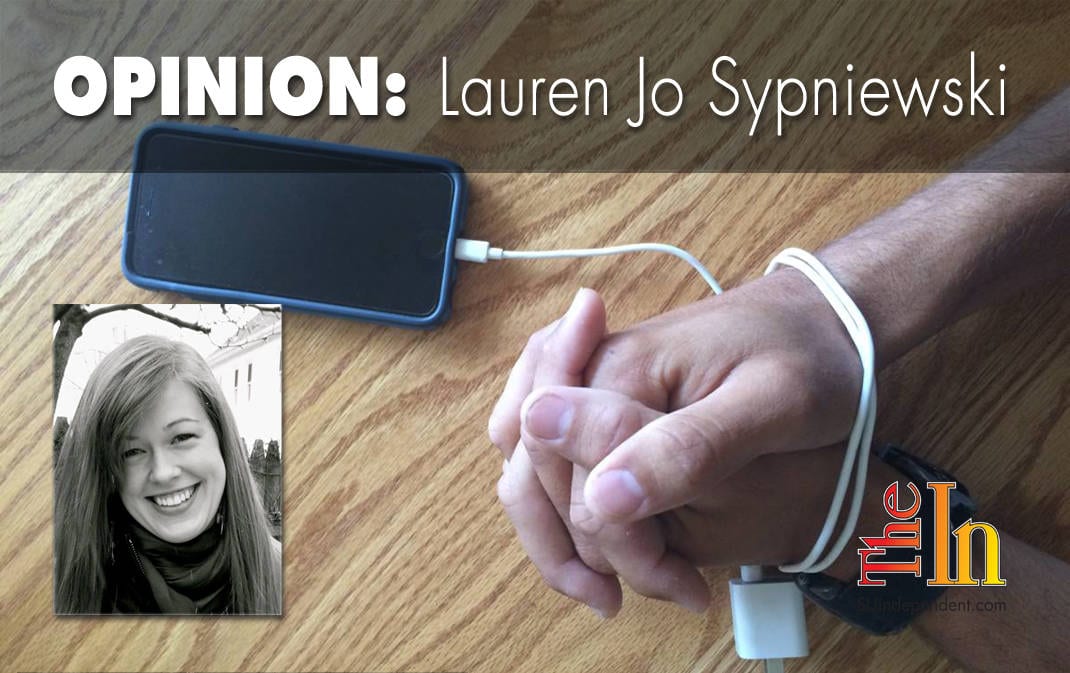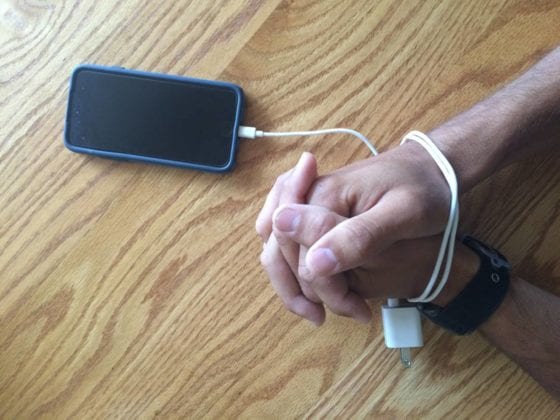 Phones, apps, texting — they’ve infiltrated our hands, heads, and lives, almost to the point of no return. Reaching into our pockets, pressing the home key, and swiping our greasy fingers across the glossy screen is almost as habitual as a smoker halfway through a cigarette before realizing he or she even pulled one out of the pack. Despite the many benefits digital communication has provided for countless individuals, the constant need to be plugged in, and thus oftentimes avoid real-life situations, may be decreasing our ability to mentally and emotionally expand. Who knows — we may be at risk for losing something very singular about being human.
Phones, apps, texting — they’ve infiltrated our hands, heads, and lives, almost to the point of no return. Reaching into our pockets, pressing the home key, and swiping our greasy fingers across the glossy screen is almost as habitual as a smoker halfway through a cigarette before realizing he or she even pulled one out of the pack. Despite the many benefits digital communication has provided for countless individuals, the constant need to be plugged in, and thus oftentimes avoid real-life situations, may be decreasing our ability to mentally and emotionally expand. Who knows — we may be at risk for losing something very singular about being human.
It’s not an uncommon sight: a game friends play to help one another stay “in the moment,” to stay off their phones, and to not avoid real-life vulnerability. It’s quite simple and looks like this — everyone places his and her phones in the center of the table (especially if out at a restaurant) or in a communal, easy-to-reach area. First one to reach for and subsequently touch their phone gets penalized. Often, when out to eat, this means paying for the entire table’s bill.
 We need more strategies like this to help one another unplug and to remind ourselves before we’ve smoked half of the metaphorical cell phone pack. Recently, it has been suggested to me to turn off all notifications. It is much easier to ignore the phone — or, at the very least, prioritize real-life interactions — when not constantly distracted by the glow and bleep of devices.
We need more strategies like this to help one another unplug and to remind ourselves before we’ve smoked half of the metaphorical cell phone pack. Recently, it has been suggested to me to turn off all notifications. It is much easier to ignore the phone — or, at the very least, prioritize real-life interactions — when not constantly distracted by the glow and bleep of devices.
Because this issue isn’t just about distraction; it’s much more than that. A student at Dixie State addressed this very concern by confessing she pulls out her phone and fakes using it in order to avoid interacting with people she knows when passing them in the hallways, elevator, and sidewalks of campus. “It’s uncomfortable,” she says, “so we take comfort by controlling and avoiding the interaction.”
She speaks to a fascinating and terrifying phenomenon: We often avoid real-life encounters by retreating to virtual — self-created — world. While the self-created aspect may be the reason we withdraw because it places us in control, we may be losing the opportunities for self-growth.
In my experiences and in those with whom I’ve spoken, we developed, become more aware, and gained insight best when placed in uncomfortable situations. It seems that perhaps we are stunting this growth if we use digital communication as a way to avoid vulnerability in present time, especially if we are in a physically social state at the time.
 Again though, the beauties of digital communication are many. We are constantly able to access family, friends, and new acquaintances across miles — and all at the same time. We aren’t restricted to the limitations and commitments of in-time response.
Again though, the beauties of digital communication are many. We are constantly able to access family, friends, and new acquaintances across miles — and all at the same time. We aren’t restricted to the limitations and commitments of in-time response.
Sherry Turkle, an MIT professor whose work seeks to understand the relationship between people and digital technology, has written a number of books including “The Second Self: Computers and the Human Spirit” and “Alone Together: Why We Expect More from Technology and Less from Each Other.” Turkle admonishes the current culture, viewing those with devices as avoiding vulnerability by skirting the commitment and responsibility inherent in real-time conversations like face-to-face interactions, phone calls, and video calls. Instead, we thrive off of control, wanting the ability to start, stop, pause, prolong, and direct conversations on our own terms.
Thus, we dive headlong into texting, a low-commitment interaction that can end at any point for any reason (“My battery died,” “I was busy,” “Had to go to work,” and “I just want to stop talking to you”). We can edit our response, take time with it, mull it over — all beautiful things when determining how best to effectively communicate with another person. However, it also sets up an unrealistic interaction — and even an unrealistic persona — that can never be recreated in a face-to-face setting due to the pressure of in-time response.
Turkle’s thoughts closely connect with those of Nicholas Carr, a technology writer and author of “Is Google Making Us Stupid?” published in The Atlantic in 2008. Overall, he argues that technology — specifically the way the Internet “rewires” our brains — is having a detrimental effect on our ability to think, comprehend, and communicate. In the end, he wonders, too, about the habitual nature of staying plugged in. He writes, “If we lose those quiet spaces, or fill them up with ‘content,’ we will sacrifice something important not only in ourselves but in our culture.”
When in social groups, we often seek the separating solace of our phones to create a protective bubble around us to avoid social vulnerability. And yet, when we are alone, we use our phones to seek out communication with others to avoid the vulnerability of being alone. This leaves us with many conundrums: Do we always need a sense of control? If we are always avoiding life in some way, how are we to tackle it? Do we fear the idea of quiet, self-reflective isolation?
In many ways, these thoughts echo the words of Gretel Ehrlich, a travel writer and author of many books, who, in her work “The Solace of Open Spaces” asserts that “We fill up space as if it were a pie shell, with things whose opacity further obstructs our ability to see what is already there.”
We fill our spaces with bleeps and glows, with profiles and staccato textual conversations. In many ways we avoid the vulnerability innate in real-life interactions by retreating to the screen. Are we really seeking entertainment and connection with virtual “others”? Or are we simply running from the idea of being alone — truly alone — with ourselves?










